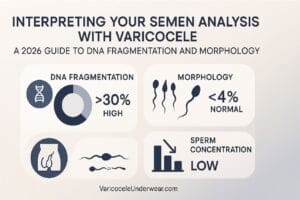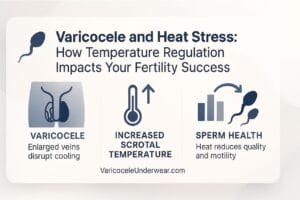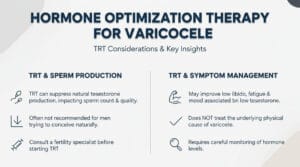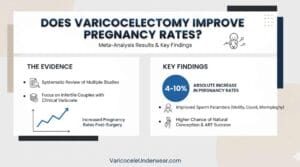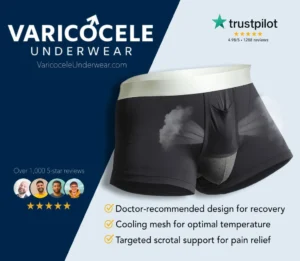Yes, you can get pregnant if your husband has a varicocele, but it may be more challenging. Varicoceles, enlarged veins in the scrotum, are a leading cause of male infertility, affecting sperm quality. However, numerous effective options exist. These range from lifestyle changes and supplements to surgical repair (varicocelectomy), which can significantly improve semen parameters. Many couples successfully conceive naturally or with assisted reproductive technology (ART) like IVF after treatment. A consultation with a urologist is the critical first step. To fully understand this condition, I recommend reading our comprehensive Varicocele Guide.
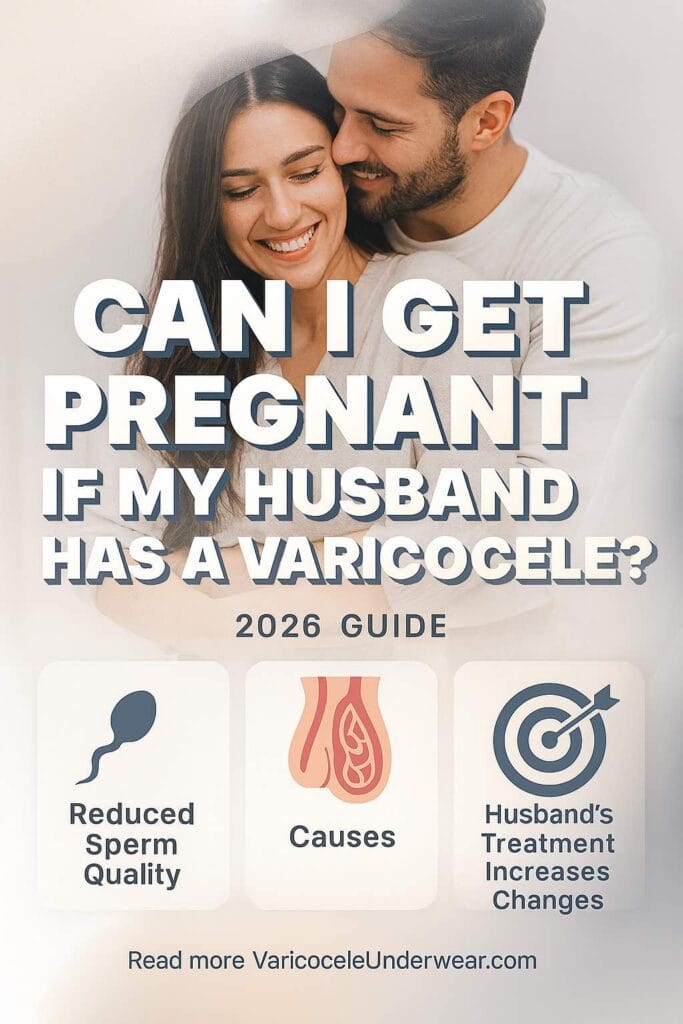

Understanding the Link: Varicocele and Male Fertility
If you’re asking this question, you’re likely feeling a mix of worry and hope. Let me be clear from the start: a varicocele diagnosis is not the end of your journey to parenthood. In my practice as a men’s health specialist, I’ve guided hundreds of couples through this exact situation. The path forward requires understanding, but it is very often successful.
What Exactly is a Varicocele?
Think of a varicocele as a “varicose vein,” but located in the scrotum. Normally, tiny valves in the veins prevent blood from flowing backward. When these valves fail, blood pools, causing the veins to enlarge and twist. This is most common on the left side (about 80-90% of cases) but can occur on both sides.
Dr. Michael Carter, Reproductive Urologist, explains: “A varicocele creates a hostile environment for sperm production. The increased blood flow raises scrotal temperature, which is detrimental to healthy sperm development. This is the primary mechanism behind its impact on fertility.”
How Common Are Varicoceles?
Varicoceles are surprisingly prevalent:
- They are found in about 15% of all adult men.
- Their prevalence jumps to approximately 40% of men with primary infertility (couples who have never conceived).
- They are found in up to 80% of men with secondary infertility (couples who have conceived before but are now struggling).
The Real-World Impact: How a Varicocele Affects Sperm
The question isn’t just if a varicocele causes problems, but how. The pooled blood increases scrotal temperature, impairing the testicles’ ability to produce healthy sperm. This typically manifests in three key ways, often visible on a semen analysis:
- Low Sperm Count (Oligospermia): The testicle simply produces fewer sperm.
- Poor Sperm Motility (Asthenospermia): The sperm that are produced don’t swim well, reducing their ability to reach and fertilize the egg.
- Abnormal Sperm Morphology (Teratospermia): The sperm are misshapen, which can hinder their ability to penetrate the egg.
A 2023 meta-analysis in Fertility and Sterility that reviewed over 4,000 patients confirmed that men with varicoceles showed significant improvements in all three of these parameters after surgical repair.
Your Path to Pregnancy: Treatment Options for Varicocele
The good news is that varicocele is one of the few treatable causes of male infertility. The best approach depends on several factors, including the severity of the varicocele, the results of the semen analysis, the female partner’s fertility status, and your timeline.
Medical Evaluation: The Essential First Step
Before any treatment, a proper diagnosis is crucial. This involves:
- Physical Exam: A urologist can often feel a varicocele during a exam, especially when you stand and bear down (Valsalva maneuver).
- Scrotal Ultrasound: This painless test confirms the diagnosis, measures the size of the veins, and checks blood flow.
- Semen Analysis: This is the cornerstone test. It provides a baseline measurement of sperm count, motility, and morphology. We typically recommend at least two analyses for accuracy.
Treatment Option 1: Varicocele Repair (Varicocelectomy)
This outpatient surgery aims to seal off the abnormal veins, redirecting blood flow to healthy veins. It’s the most direct way to address the root cause.
Surgical Techniques:
- Microsurgical Varicocelectomy: Considered the gold standard. Using an operating microscope, the surgeon can precisely identify and ligate the problematic veins while preserving arteries and lymphatics. This results in the highest success rates and lowest complication (like hydrocele formation) and recurrence rates (<2%).
- Laparoscopic/Robotic Repair: Less common for standard cases, but may be used in certain situations, like bilateral varicoceles.
- Percutaneous Embolization: A interventional radiologist threads a catheter through a vein in the groin or neck to block the veins with coils or sclerosant. It’s less invasive but may have a slightly higher recurrence rate.
Success Rates of Varicocelectomy:
- Semen Improvement: Studies show 60-80% of men show significant improvement in semen analysis parameters within 3-6 months post-surgery.
- Natural Pregnancy Rates: The natural pregnancy success rate for couples after varicocelectomy ranges from 30% to 60% over one to two years, depending on the study and female factors.
- A landmark 2022 study in the World Journal of Men’s Health reported a 41% natural pregnancy rate in the surgery group versus 16% in the observation group.
Treatment Option 2: Assisted Reproductive Technology (ART)
Sometimes, the combination of male and female factors, or the couple’s preferences, makes ART the preferred path. A varicocele repair can still be beneficial before proceeding with ART.
- Intrauterine Insemination (IUI): Washed sperm are placed directly into the uterus. This is often a first step if sperm parameters are mildly to moderately affected after varicocele treatment or if the varicocele is small.
- In Vitro Fertilization (IVF): Eggs are retrieved and fertilized with sperm in a lab. This is a common choice for more severe male factor infertility.
- Intracytoplasmic Sperm Injection (ICSI): A single sperm is injected directly into an egg. This powerful technique can overcome even severe male factor issues. A 2024 review highlighted that men who had a varicocelectomy before ICSI often had better fertilization rates and embryo quality, suggesting that surgery improves the overall health of the sperm, even if the count remains low.
Case Study: Mark and Sarah’s Journey
Mark, 34, and Sarah, 32, had been trying to conceive for 18 months. Mark’s semen analysis revealed a count of 12 million/mL with 30% motility (poor). He was diagnosed with a Grade III left-sided varicocele. Sarah’s fertility workup was normal.
We discussed options: proceed directly to IVF/ICSI or consider varicocelectomy. Given their desire to try for a natural conception and their age, Mark opted for a microsurgical varicocelectomy.
Six months post-surgery, his repeat semen analysis showed dramatic improvement:
- Sperm Count: Increased to 42 million/mL.
- Motility: Improved to 52% (excellent).
They were advised to continue trying naturally. Five months later, I received the happy email: Sarah was pregnant. They successfully delivered a healthy baby girl. This case illustrates how treating the male factor can sometimes be the most straightforward path to pregnancy.
Supporting Sperm Health: Lifestyle and Natural Approaches
While surgery addresses the mechanical issue, optimizing overall health is non-negotiable. I advise all my patients to consider these steps, whether they choose surgery or not.
- Diet & Nutrition: A Mediterranean-style diet rich in antioxidants (berries, nuts, leafy greens) can combat oxidative stress, which damages sperm.
- Supplements: Certain supplements have strong evidence. I often recommend a combination of:
- Coenzyme Q10 (200-300mg/day): Supports cellular energy in sperm.
- Folic Acid & Zinc: A study showed this combination significantly increased sperm count.
- L-Carnitine: Shown to improve sperm motility.
- > Always consult your doctor before starting any supplement regimen.
- Avoid Heat Exposure: Minimize hot tubs, saunas, and tight underwear – try breathable cooling underwear.
- Maintain a Healthy Weight: Obesity is linked to poorer sperm quality.
- Limit Toxins: Reduce alcohol, quit smoking, and avoid recreational drugs.
Myth-Busting: Common Varicocele Questions Answered
Myth 1: “If I have a varicocele but no pain, I don’t need to worry about it.”
Fact: Even an asymptomatic (“silent”) varicocele can progressively damage testicular function and sperm production over time. If future fertility is a concern, evaluation is recommended.
Myth 2: “Varicocele surgery is very risky and has a long recovery.”
Fact: Modern microsurgical techniques are outpatient procedures with minimal risk. Most men return to desk work within 2-3 days and full activity within 2-3 weeks.
Myth 3: “IVF is always the better, faster option.”
Fact: While IVF/ICSI is powerful, it is also expensive, invasive for the female partner, and not without its own risks. Varicocele repair is a one-time treatment that can lead to natural pregnancies for this and future children, making it a cost-effective and natural first-line option for many couples.
Conclusion: A Message of Hope
The journey from a varicocele diagnosis to a positive pregnancy test can feel long, but it is a well-traveled path with a clear roadmap. The answer to “Can I get pregnant?” is a resounding yes. The key is a proactive, partnered approach.
Your Action Plan:
- Schedule a Consultation: See a reproductive urologist or men’s health specialist for a full evaluation.
- Get a Semen Analysis: This is your baseline.
- Have a Joint Discussion: Both partners should be involved in the decision-making process with your doctor.
The goal is not just to achieve a pregnancy, but to build a healthy family. Addressing a varicocele is a powerful step in that direction.

